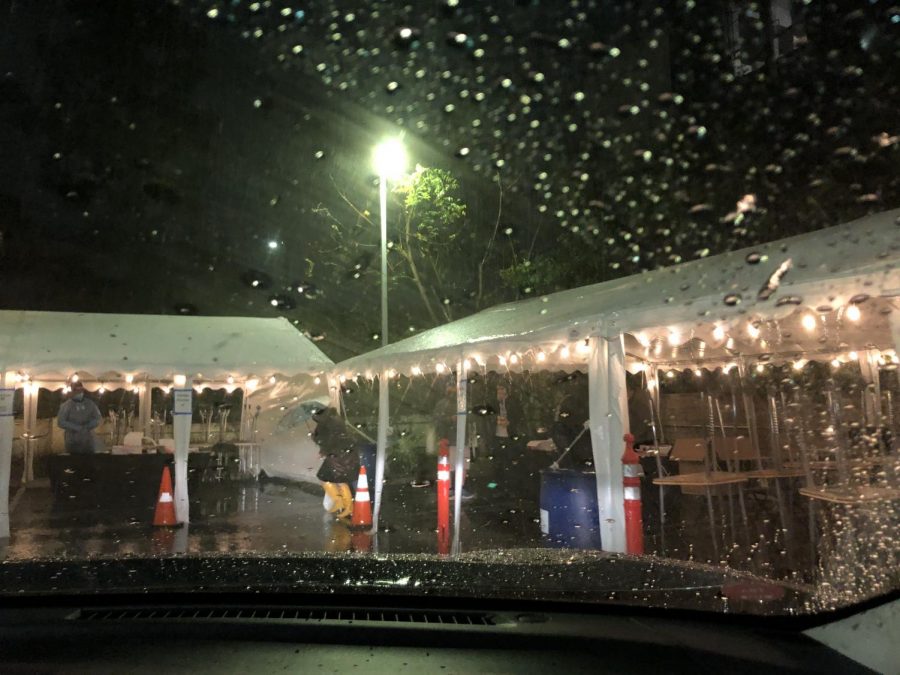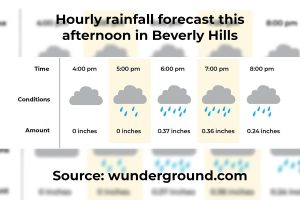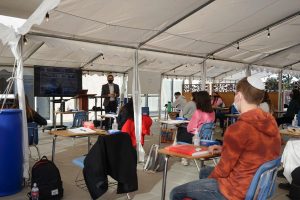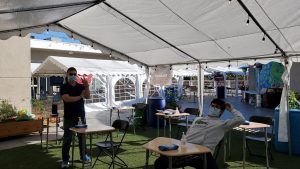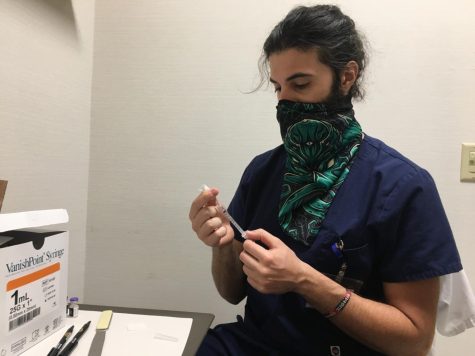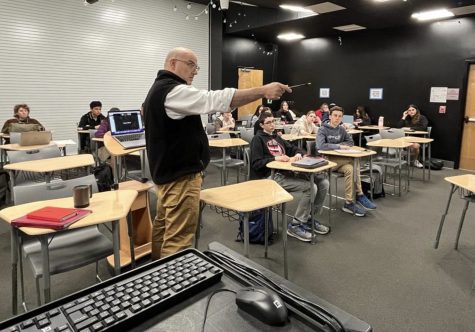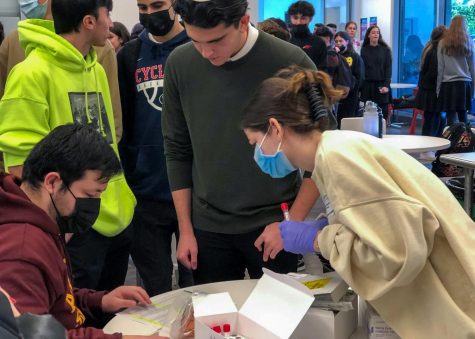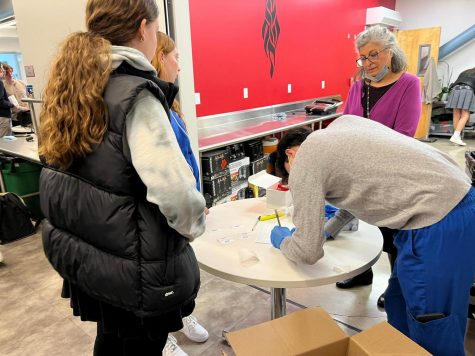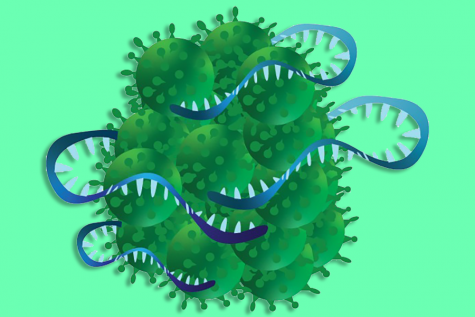Covid tests will be required for all students who want to attend in-person next week
Second semester starts with one class on campus at a time, as before
RAIN: Covid tests went on as planned Thursday evening in spite of heavy rain. All students who plan to come to school next week were required to get the test.
For the first time this year, all Shalhevet students will have to be tested for Covid-19 this week if they wish to attend in-person school next week, school officials have announced.
The requirement was issued Jan. 14, and details were added last Sunday. A drive-through Covid testing station will be set up on campus this afternoon, and all students must participate if they want to attend optional on-campus classes for the week of Feb. 1.
Covid tests were not required this week, however, as the school’s second semester began Monday open once again for optional on-campus learning in Judaic Studies. The so-called “hybrid learning” program, with each grade on campus for Judaic Studies on a different day per week, was cancelled the week after New Year’s and then reinstated for the final week of the fall semester, which ended Jan. 15.
The email sent to Shalhevet families Jan. 14 gave no reason for the first-ever Covid testing requirement. But Dr. Noam Drazin, Shalhevet’s board president and a member of the Medical Task Force, told the Boiling Point it most likely would not be a regular occurrence.
“We were given the opportunity to get this testing done, so we figured it would be a nice service to offer to students, in order to better define safety,” Dr. Drazin said. “In terms of requiring it in the future, probably less so as [Covid] numbers start coming down.”
According to Dr. Drazin, if the school had enacted its original one week on, one week off hybrid schedule — with two grades on campus at a time for an entire week — the student body would have been tested every couple weeks.
Today, students who want to come to campus next week will be required to drive into the parking lot some time between five and eight p.m and be swabbed for Covid-19.
Other than the possibly one-time testing requirement, the second-semester schedule mirrors that of past weeks, with each grade being invited to campus for one day. The order for this week was freshmen on Monday, sophomores Tuesday, juniors Wednesday, and seniors Thursday; next week it will be the reverse. Camp Firehawks resumed as well after school.
According to Dr. Drazin, on-campus learning was suspended after New Year’s because students had participated over the break in indoor activities that did not comply with social-distancing policies. Officials said at least one joined a New Years’ Eve party bus.
“The closure [was for] a very specific reason,” Dr. Drazin told the Boiling Point in an interview Jan. 9. “That was noting the behavior of some students and some families in the community that led to the, we felt, imperative to shut down the school. In essence to teach people a lesson.”
For the week of Jan. 11, officials decided to re-open for in-person learning to “get another week in,” he said.
“We’re still going to be doing the same methods, same guidelines, same outside learning that we’ve done in the past, which has turned out to be quite safe,” Dr. Drazin said. “There hasn’t been a single on-campus exposure or case at Shalhevet, which I cannot say for the rest of the community schools out there — both elementary and high school.”
A safety benefit of having school open, he said, is the opportunity to “enforce social distancing and enforce the type of guidelines that limit the spread of this disease,” Dr. Drazin said.
“We can’t force people to stay in their homes, we can’t force people to not hang out with their friends and other families,” he said, “but at least one day a week they are spending eight hours on the campus doing that. In all honesty, the data shows that school exposures and school environments are actually much less risky in the community, and that data was even in the indoor schooling.” But LA County’s huge January spike in cases did affect optional in-person attendance. During the week of Jan. 11, the last week of the semester, only three seniors, nine juniors, and seven sophomores attended in-person. The freshman number was believed to have been higher but the Boiling Point was unable to confirm an actual count.
As an incentive to attend school this week, administration announced a lunchtime barbecue with a choice of hamburgers, hotdogs or steak, with on Monday Principal Mr. Daniel Weslow was on the third-floor turf wielding a spatula over the school’s portable grill. They also promised “fun grade-wide competitions.”
Junior Marlee Drazin said she did not see any games or competitions at school today, but she did enjoy the barbeque during lunch.
“There were not a ton of activities today, I’m thinking because there were about seven-to-10 kids in total who came to school,” Marlee said. “We did have a barbeque lunch which was really nice and we were able to hang out and talk with each other and some teachers.”
There were reports of numerous Covid cases amongst Shalhevet students following the break, but the Boiling Point was unable to confirm a number and Chief Operating Officer Sarah Emerson said she “cannot comment on specific cases.”
On Jan. 2, Associate Head of School Rabbi Block emailed 10th-grade parents and students threatening to prohibit sophomores from going on-campus for school or Camp Firehawks for the upcoming week if the school was not informed of students who had taken part in unsafe activities over New Years.
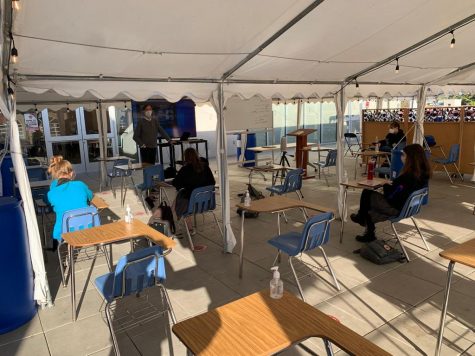
“It has come to our attention that a few 10th-grade students attended unsafe New Year’s Eve celebrations (including reports of a party bus),” Rabbi Block wrote in the email. “Unless we feel confident that we know the specifics and that we can track exposures, I’m afraid we’ll have to cancel in-person school this week, including participation in Camp Firehawks programming, for all sophomores.”
In an email sent to parents and students at 11:24 p.m. on Sunday night Jan. 3, administration officials announced the cancellation of on-campus Judaic Studies and Camp Firehawks for the week of Jan. 9.
“As the weekend progressed, we heard of more and more reports of potentially unsafe gatherings in which our students were involved,” said an email signed by Head of School Rabbi Ari Segal, Associate Head of School Rabbi David Block, General Studies Principal Mr. Daniel Weslow, and Chief Operating Officer Mrs. Sarah Emerson.
“While numbers grew in LA County, we were still quite comfortable opening this week with all of our standard safety precautions. But because many students decided to hang out in unsafe conditions, we are pressing pause on in-person learning for all grades this week. This pause includes in-person Camp Firehawks programming [emphasis in original].”
Also, on Jan. 3, Rabbi Block emailed the entire community saying that “a few” Judaic Studies teachers were either exposed or had contracted Covid-19. The Boiling Point has confirmed at least two January cases amongst Judaics staff, including two rabbis.
But Dr. Drazin said the students who recently tested positive in the Shalhevet community were not exposed on campus, he said, so the school did not need to close. He said for the school to shut down again, there would need to be three “epi-linked” cases, meaning a student or teacher would have to spread the virus to three other individuals while on campus who were from different families.
Dr. Drazin said the school discovered that the students were not exposed on campus through investigation efforts such as interviewing the students.
On Jan. 27, LA County reported an additional 6,917 cases and 307 new deaths.
The City of Los Angeles’ Emergency Management Department, which reports weekly Covid-19 cases by neighborhood, reported 44 new cases in Beverlywood the week of Jan. 16-Jan. 22. That week there were also 160 new cases in Westwood and 51 in Hancock Park.
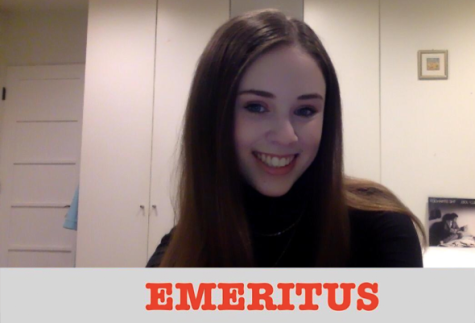
Molly is studying at Midreshet Torah v'Avodah seminary in Jerusalem and will attend Columbia University in New York next year.
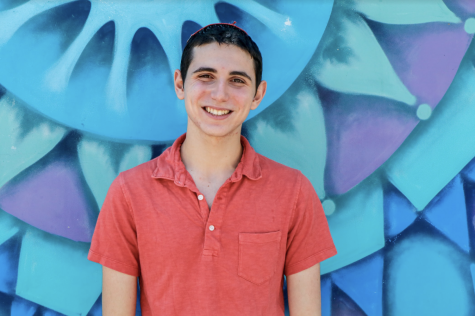
Benjamin Gamson, 12th grade, is in his second year as an Editor-in-Chief of the Boiling Point, having served last year as only the second junior to hold that post himself. Benjamin joined the Boiling Point during his freshman year as a staff writer and became Polling Director during the second semester. As News Editor in his sophomore year, Benjamin managed and edited the Community, Torah and Outside News sections.
Benjamin has authored over 70 articles and podcasts and won awards from organizations including AJPA, JSPA and NSPA. Outside of Boiling Point, he is a member of the Model Congress team and an active participant in the Just Community. When not in school, Benjamin enjoys following politics, current events and baseball, and listening to music.

